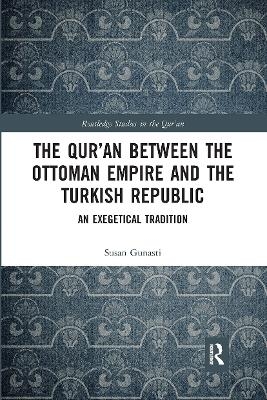
The Qur'an between the Ottoman Empire and the Turkish Republic
An Exegetical Tradition
Seiten
2020
Routledge (Verlag)
978-0-367-67171-6 (ISBN)
Routledge (Verlag)
978-0-367-67171-6 (ISBN)
The Qur’an between the Ottoman Empire and the Turkish Republic is one of the few book-length studies on an Ottoman Qur’an commentary. Its premise is that "the Ottoman Empire" did not come to an end until 1950 so far as Islam was concerned in Turkey.
The work explores the relationship between Elmalılı’s Qur’an commentary and the intellectual trends of the period, including the impact of materialism, the sciences, notions of civilizational progress, and philosophy. In doing so, this study emphasizes the "local" aspect of the Qur’an commentary, through a sustained focus on the Istanbul context in which it was written. This work demonstrates that Elmalılı’s Qur’an commentary is a product of and reaction to the religious, intellectual, political, and social trends of the period. This work, in considering all the factors that led to the commissioning of Elmalılı’s Qur’an commentary, also contributes to our understanding of the history of Islam in early to mid-twentieth-century Turkey.
This intellectual history of modern Islamic thought contributes to our understanding of the genre of Qur’an commentary in the early twentieth century. It is a key text for students and scholars interested in Islam in the Ottoman Empire and Turkey, modern Islamic thought, and the Middle East.
The work explores the relationship between Elmalılı’s Qur’an commentary and the intellectual trends of the period, including the impact of materialism, the sciences, notions of civilizational progress, and philosophy. In doing so, this study emphasizes the "local" aspect of the Qur’an commentary, through a sustained focus on the Istanbul context in which it was written. This work demonstrates that Elmalılı’s Qur’an commentary is a product of and reaction to the religious, intellectual, political, and social trends of the period. This work, in considering all the factors that led to the commissioning of Elmalılı’s Qur’an commentary, also contributes to our understanding of the history of Islam in early to mid-twentieth-century Turkey.
This intellectual history of modern Islamic thought contributes to our understanding of the genre of Qur’an commentary in the early twentieth century. It is a key text for students and scholars interested in Islam in the Ottoman Empire and Turkey, modern Islamic thought, and the Middle East.
Susan Gunasti is an associate professor of religion at Ohio Wesleyan University. She obtained her doctorate from Princeton University from the Department of Religion. Her research interests are Qur’an commentary, Islam in the Ottoman Empire, and Islamic political thought.
Introduction 1. A Religious Scholar’s Life in a Tumultuous Period 2. Qur’an Commentary in the Nineteenth Century 3. Commissioning a Qur’an Commentary Suitable for the Modern Period 4. The Philosophical Context of Elmalılı’s Religious Understanding 5. Hak Dîni and Its Contemporary Concerns Conclusion
| Erscheinungsdatum | 16.01.2021 |
|---|---|
| Reihe/Serie | Routledge Studies in the Qur'an |
| Verlagsort | London |
| Sprache | englisch |
| Maße | 156 x 234 mm |
| Gewicht | 453 g |
| Themenwelt | Geisteswissenschaften ► Religion / Theologie ► Islam |
| ISBN-10 | 0-367-67171-9 / 0367671719 |
| ISBN-13 | 978-0-367-67171-6 / 9780367671716 |
| Zustand | Neuware |
| Informationen gemäß Produktsicherheitsverordnung (GPSR) | |
| Haben Sie eine Frage zum Produkt? |
Mehr entdecken
aus dem Bereich
aus dem Bereich


